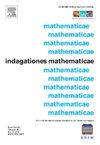A note on the Diophantine equations 2ln2=1+q+⋯+qα and application to odd perfect numbers
IF 0.5
4区 数学
Q3 MATHEMATICS
引用次数: 0
Abstract
Let be an odd perfect number. Then, Euler proved that there exist some integers and a prime such that , , and . In this note, we prove that the ratio is neither a square nor a square times a single prime unless . It is a direct consequence of a certain property of the Diophantine equation , where denotes one or a prime, and its proof is based on the prime ideal factorization in the quadratic orders and the primitive solutions of generalized Fermat equations . We give also a slight generalization to odd multiply perfect numbers.
关于 Diophantine 方程 2ln2=1+q+⋯+qα 及其在奇完全数中的应用的说明
设 N 是奇完全数。然后,欧拉证明存在一些整数 n,α 和素数 q,使得 N=n2qα,q∤n,并且 q≡α≡1mod4 。在本注中,我们将证明,除非 α=1 ,否则比值 σ(n2)qα 既不是一个平方,也不是一个平方乘以一个质数。它是二阶方程 2ln2=1+q+⋯+qα(其中 l 表示一个质数或一个素数)的某个性质的直接结果,其证明基于二次阶 Z[1-q] 中的素理想因式分解和广义费马方程 xβ+yβ=2z2 的原初解。我们还给出了对奇数乘完全数的细微推广。
本文章由计算机程序翻译,如有差异,请以英文原文为准。
求助全文
约1分钟内获得全文
求助全文
来源期刊
CiteScore
1.20
自引率
16.70%
发文量
74
审稿时长
79 days
期刊介绍:
Indagationes Mathematicae is a peer-reviewed international journal for the Mathematical Sciences of the Royal Dutch Mathematical Society. The journal aims at the publication of original mathematical research papers of high quality and of interest to a large segment of the mathematics community. The journal also welcomes the submission of review papers of high quality.

 求助内容:
求助内容: 应助结果提醒方式:
应助结果提醒方式:


